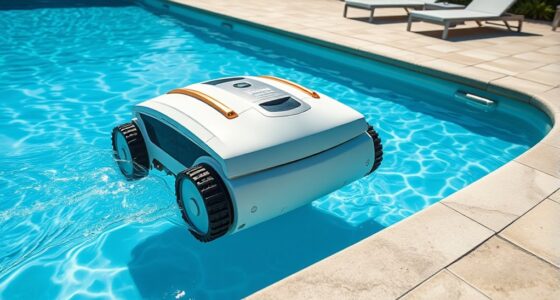Automatic pool cleaners have transformed pool maintenance, offering efficient, hands-free cleaning thanks to advanced navigation, sensors, and smart features. They come in various types like robotic, pressure, and suction models, each designed to simplify debris removal and surface scrubbing. These devices save you time, reduce effort, and improve water quality, while ongoing innovations bring smarter, more adaptive, and eco-friendly options. Want to discover how these innovations can make your pool care easier? Explore further to learn more.
Key Takeaways
- Technological innovations like AI, sensors, and smart navigation have significantly enhanced the efficiency and effectiveness of automatic pool cleaners.
- Integration with smart home systems allows remote control, real-time monitoring, and improved user convenience.
- The variety of cleaners, including robotic, pressure, suction, and cordless models, caters to diverse pool sizes and surfaces.
- Advances in filtration, debris handling, and maintenance features extend device lifespan and simplify pool upkeep.
- Future trends focus on increased automation, eco-friendly operations, and personalized cleaning via smarter, more adaptive technologies.
The Evolution of Pool Cleaning Technology
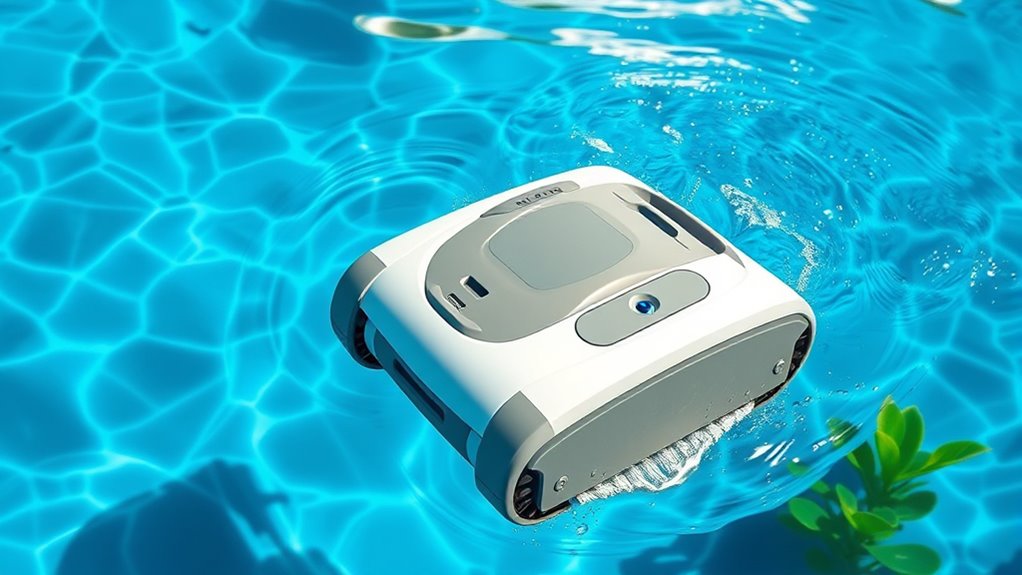
The evolution of pool cleaning technology has transformed the way you maintain a spotless pool with minimal effort. Robotic advancements now allow automatic cleaners to navigate your pool efficiently, covering every inch without you lifting a finger. These devices utilize sophisticated water filtration systems that trap dirt, debris, and algae, keeping your water crystal clear. Modern robots are equipped with sensors to detect obstacles and optimize cleaning routes, reducing energy use and increasing effectiveness. With ongoing innovation, these cleaners can adapt to different pool shapes and sizes, offering a seamless experience. Additionally, airless paint sprayers, which are highly rated for their durability and efficiency, exemplify how advanced technology can improve performance and ease of use. Proper maintenance and filter replacement are essential for keeping these cleaners operating at peak efficiency, ensuring your pool remains pristine. Regularly inspecting the hoses and seals can prevent leaks that reduce cleaning effectiveness. Incorporating smart home integration features allows you to control and monitor your pool cleaner remotely, providing greater convenience and peace of mind. Furthermore, the development of automated navigation systems has significantly enhanced the thoroughness and reliability of these robotic cleaners. This technological progress means you spend less time scrubbing and more time enjoying your pool, knowing that advanced water filtration and robotics are working tirelessly to keep it pristine.
Types of Automatic Pool Cleaners
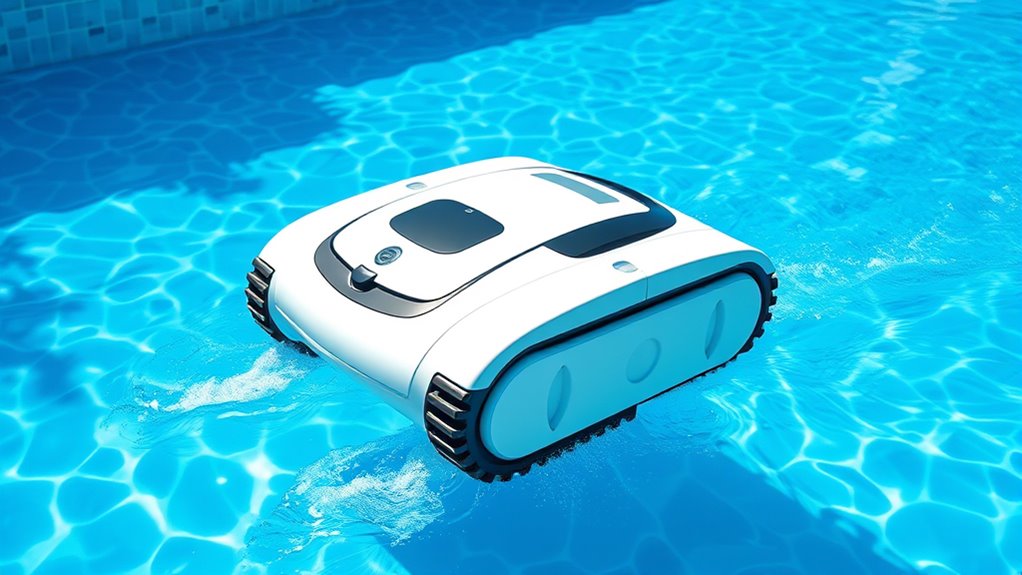
Automatic pool cleaners come in several types, each designed to suit different pool sizes, shapes, and cleaning needs. You’ll find options that leverage robotic technology, offering advanced navigation and thorough cleaning. Some cleaners prioritize energy efficiency, reducing power consumption while maintaining performance.
Automatic pool cleaners come in various types to meet different pool sizes, shapes, and cleaning requirements.
Here are the main types:
- Robotic Pool Cleaners: Utilize robotic technology for autonomous and efficient cleaning. These cleaners often include advanced navigation systems that adapt to pool layouts for comprehensive coverage. Proper maintenance of robotic cleaners is essential to ensure longevity and optimal performance. Additionally, robotic cleaners often feature high-performance brushes that improve debris removal.
- Pressure Side Cleaners: Use pool pressure to move and collect debris, suitable for larger pools.
- Suction Side Cleaners: Attach to your skimmer and use suction to pick up dirt.
- Automatic Vacuums: Manual or semi-automatic, often budget-friendly.
- Cordless Cleaners: Offer mobility and energy efficiency without cords.
Each type caters to specific needs, making it easier for you to find the right fit. Proper pool tuning can also optimize cleaning performance and efficiency.
Key Features to Consider When Choosing a Cleaner
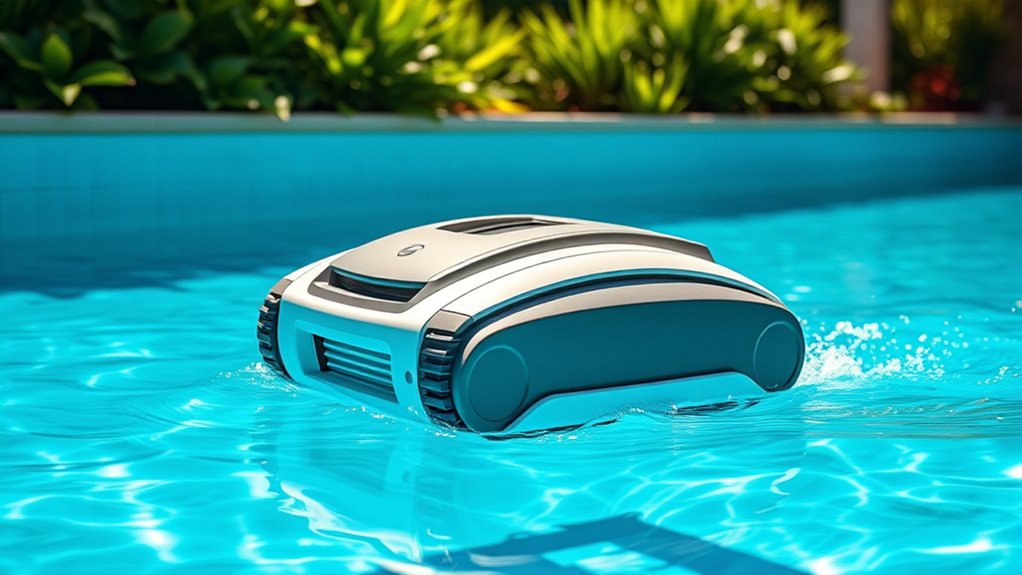
When choosing an automatic pool cleaner, you’ll want to consider how well it navigates your pool and covers all areas efficiently. Pay attention to its filtration and debris handling capabilities to ensure it keeps your water clean without frequent maintenance. These key features can make a big difference in how effective and convenient your cleaning experience is. Additionally, understanding the performance upgrades available for different vehicles highlights the importance of selecting a cleaner with adaptable features to meet your specific pool conditions. Recognizing couple dynamics can also be helpful, as it underscores the importance of choosing a cleaner that fits your pool’s unique shape and size for optimal results. Selecting a device with color protection features can help maintain your pool’s aesthetic and reduce the frequency of chemical adjustments needed over time. Moreover, evaluating the navigation systems used in automatic pool cleaners can significantly impact their overall efficiency and thoroughness.
Navigation and Coverage
Choosing a cleaner with effective navigation and coverage guarantees your pool gets thoroughly cleaned without missing spots or wasting time. Look for models with high navigation accuracy and advanced obstacle detection to guarantee the cleaner maneuvers efficiently around your pool. Proper navigation prevents missed areas and reduces cleaning time, saving you effort and energy. Obstacle detection helps the cleaner avoid walls, ladders, and pool toys, preventing damage and tangling. Features like smart mapping and randomized path algorithms enhance coverage, leaving no debris behind. A well-designed navigation system ensures every inch of your pool gets attention, making the cleaning process faster and more thorough. Incorporating AI-driven navigation can further optimize the cleaning routes for maximum efficiency. Advanced navigation systems utilize sensors and algorithms to adapt to different pool shapes and obstructions, ensuring comprehensive coverage. A sophisticated navigation system may also integrate sensor technology to detect dirtier areas and prioritize them during cleaning, improving overall effectiveness. Regularly updating the cleaner’s firmware can also improve navigation accuracy and performance over time. Investing in these features guarantees a spotless pool with minimal hassle and maximum efficiency. Affiliate disclosures provide transparency about product recommendations and partnerships, ensuring you can trust the information while choosing the best cleaner.
Filtration and Debris Handling
Have you considered how well a cleaner’s filtration system can keep your pool sparkling? A good filtration system traps dirt, leaves, and debris efficiently, preventing them from resettling in your pool. Look for models with high-quality filter media, like fine mesh or cartridge filters, which capture smaller particles for cleaner water. filter media quality directly impacts the cleaner’s ability to maintain water clarity and reduce maintenance frequency. Debris bags are also essential; larger bags reduce the need for frequent emptying, saving you time. Some automatic cleaners feature easy-to-access debris chambers, making maintenance straightforward. Proper debris handling ensures your pool stays clear longer and reduces strain on the cleaner’s motor. Selecting a cleaner with effective debris removal capabilities can significantly enhance your pool’s overall cleanliness and water quality. Additionally, understanding the importance of efficient debris management can help you select a model that maintains water quality effectively.
Benefits of Using Automatic Pool Cleaners
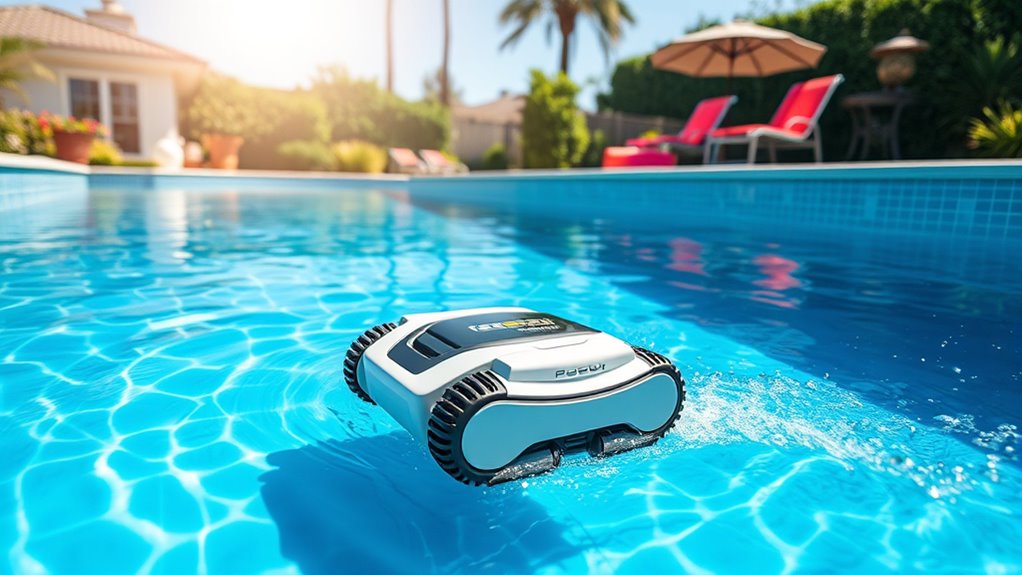
Automatic pool cleaners offer significant convenience by reducing the time and effort needed to keep your pool clean. They handle debris and dirt efficiently, saving you hours each week. Plus, their energy-efficient operation helps lower your utility bills, contributing to overall cost savings. By automating cleaning tasks, you avoid manual scrubbing and skimming, making maintenance easier. These cleaners also ensure a more thorough and consistent clean, preventing algae buildup and extending your pool’s lifespan. Additionally, their quiet operation means less noise disruption. Investing in an automatic cleaner means less hassle and more time to enjoy your pool. Utilizing automatic cleaning technology can further optimize your pool maintenance routine. Modern models often incorporate smart navigation systems to improve cleaning coverage and efficiency. Understanding UV radiation and proper protection can also help maintain your pool area safe from sun damage when outdoors. Regular maintenance and proper filter cleaning can also enhance the effectiveness and lifespan of your automatic pool cleaner.
How Automatic Pool Cleaners Work
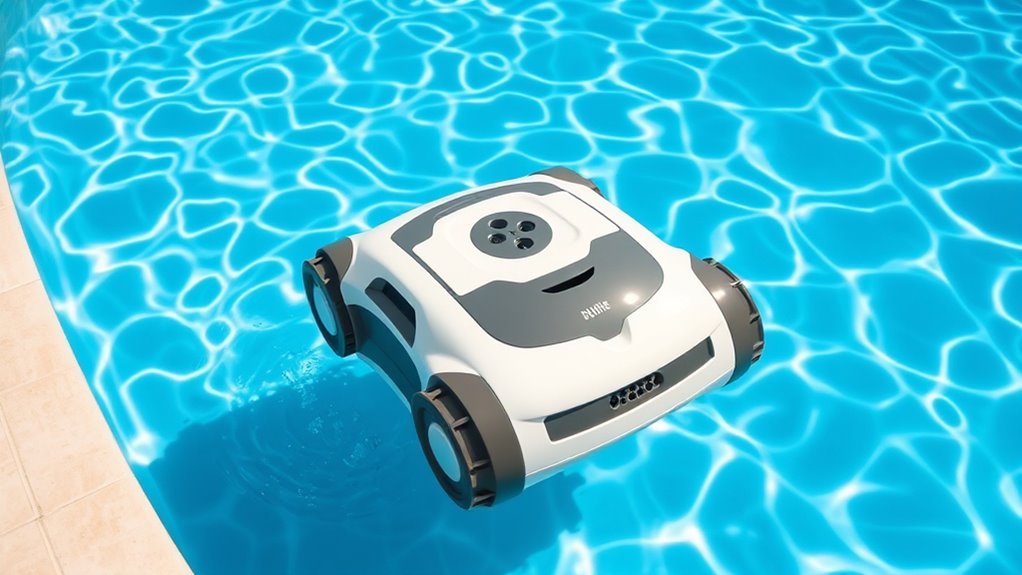
Automatic pool cleaners use navigation systems and sensors to map out your pool and avoid obstacles. They rely on cleaning mechanisms and brushes to scrub surfaces and pick up debris effectively. Power sources and charging stations keep them running efficiently for consistent cleaning sessions.
Navigation Systems and Sensors
Ever wondered how these pool cleaners efficiently navigate your swimming pool? They rely on advanced navigation systems and sensors to map out the area and avoid obstacles. These cleaners use mapping algorithms to create a virtual layout of your pool, ensuring complete coverage. Obstacle detection sensors help identify objects like ladders, toys, or pool steps, preventing collisions. Some models incorporate dual-directional sensors, while others use infrared or ultrasonic technology for better accuracy. This smart navigation allows the cleaner to plan the most efficient route, saving time and energy. Key features include:
- Mapping algorithms for all-encompassing coverage
- Obstacle detection sensors for collision avoidance
- Infrared and ultrasonic sensors for precision
- Real-time navigation adjustments
- Memory capabilities for future pool cleanings
These features work together to keep your pool spotless efficiently.
Cleaning Mechanisms and Brushes
Once the navigation system determines the most efficient route, the cleaning mechanism gets to work. Your automatic pool cleaner uses robotic brushes and scrubbing mechanisms to remove dirt, algae, and debris from the pool surfaces. The robotic brushes rotate and scrub the walls and floor, dislodging stubborn grime that might be hard to reach manually. These brushes are designed to adapt to different surface textures, ensuring thorough cleaning without damaging the pool’s interior. The scrubbing mechanisms work in tandem with the brushes, providing extra agitation to loosen stubborn debris. This combination allows your cleaner to efficiently clean the entire pool, leaving it sparkling and hygienic. Essentially, the brushes and scrubbing mechanisms are the workhorses that make automatic pool cleaning effective and hassle-free.
Power Sources and Charging
Have you ever wondered how these pool cleaners stay powered during their cleaning sessions? Most rely on rechargeable batteries or solar power. Rechargeable batteries provide a reliable energy source, allowing the cleaner to operate for hours before needing a recharge. Some models incorporate solar power panels to harness sunlight, reducing the need for manual charging. These options make cleaners more eco-friendly and cost-effective.
Here’s what you should know:
- Rechargeable batteries store power for extended use
- Solar power panels convert sunlight into energy
- Charging docks or stations recharge batteries automatically
- Battery life varies by model and usage
- Solar-powered cleaners are ideal for sunny climates
Understanding these power sources helps you choose the right automatic pool cleaner for your needs.
Maintenance and Troubleshooting Tips
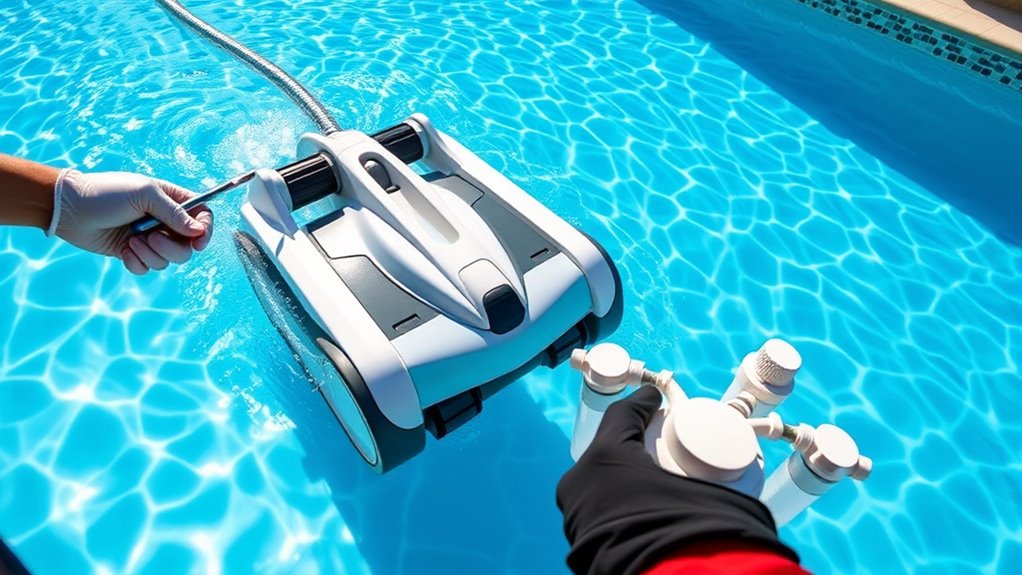
Regular maintenance is essential to keep your automatic pool cleaner functioning effectively. Start by regularly checking and balancing your pool chemicals; proper pool chemical balancing prevents debris buildup and keeps your cleaner operating smoothly. Clean the filter and brushes to remove dirt and hair that can clog the system. Inspect hoses and connections for leaks or damage. If your cleaner isn’t moving properly, it might be time for troubleshooting, such as checking the power source or motor. Additionally, if your pool’s temperature fluctuates or issues arise with pool heater repair, it can impact overall water circulation, affecting your cleaner’s performance. Keep an eye on these components, and always follow manufacturer instructions for troubleshooting and maintenance to prolong your cleaner’s lifespan and ensure peak operation.
Impact on Pool Care Industry
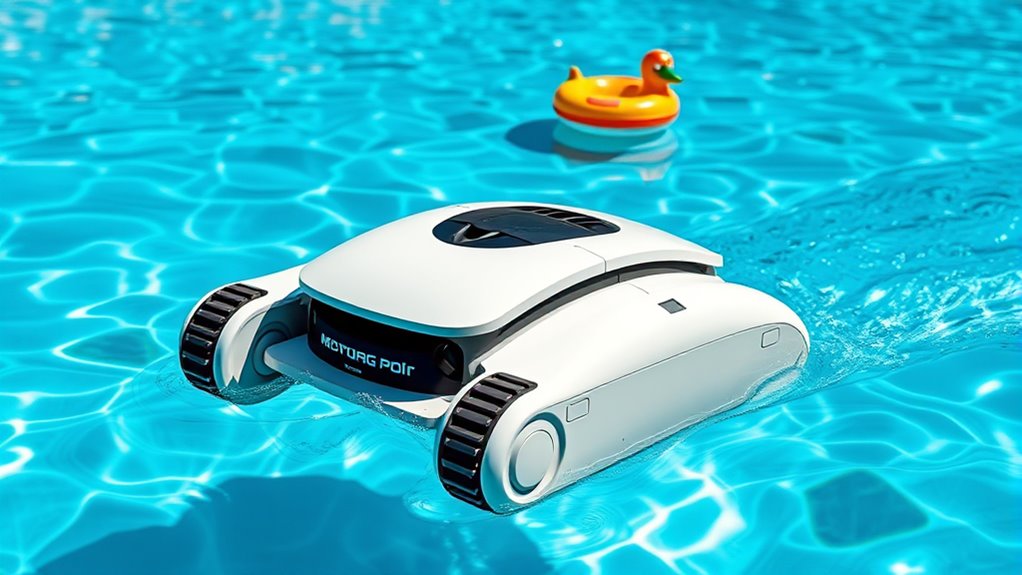
Automatic pool cleaners have considerably transformed the pool care industry by making maintenance more accessible and efficient. They reduce the time and effort needed for pool maintenance, allowing you to keep your pool cleaner with less hassle. This shift has also influenced the industry’s approach to environmental impact, encouraging eco-friendlier technologies that use less energy and water. As a result, service providers now offer more advanced, sustainable solutions, and consumers benefit from lower operational costs.
Key impacts include:
- Faster, more consistent pool cleaning routines
- Reduced reliance on chemical treatments
- Lower energy consumption and environmental footprint
- Increased demand for innovative, eco-friendly models
- Changes in professional pool service offerings and pricing
This evolution is shaping a more sustainable future for pool care.
Comparing Manual and Automated Cleaning
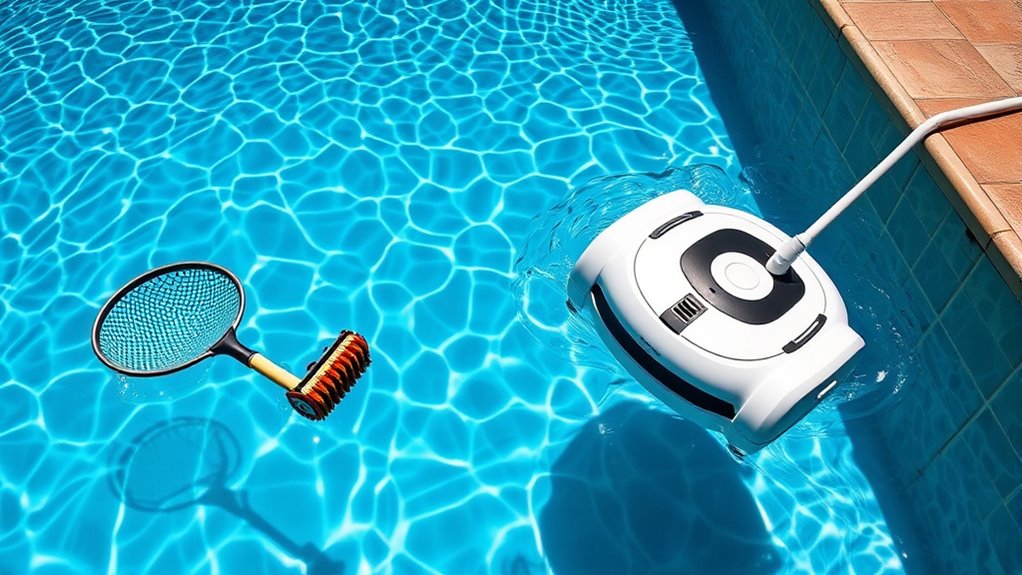
Manual and automated pool cleaning methods each offer distinct advantages and challenges, allowing you to choose based on your specific needs and preferences. Manual cleaning requires your manual effort, such as scrubbing walls and skimming debris, giving you control over water chemistry and thoroughness. It can be time-consuming but ensures detailed cleaning, especially in hard-to-reach spots. Automated cleaners, like robotic devices, reduce your effort by handling routine tasks independently, saving time and effort. However, they may require regular maintenance and occasional oversight. While manual cleaning gives you full control over water chemistry adjustments, automated cleaners focus on debris removal, which can influence water quality indirectly. Your choice depends on how much time you want to invest and the level of precision you desire in maintaining water chemistry.
Future Trends in Pool Cleaning Innovation
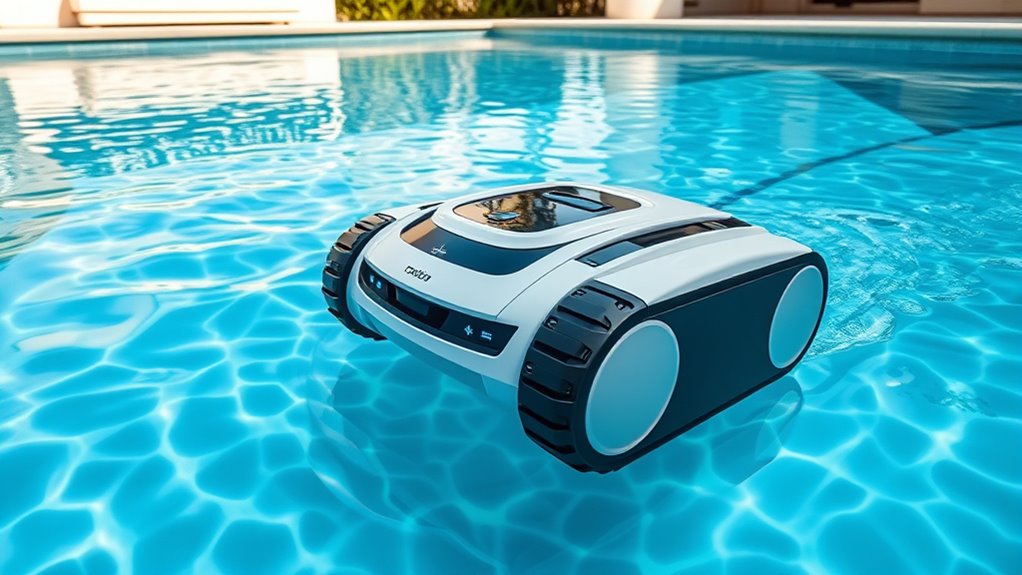
Advancements in technology are shaping the future of pool cleaning, making devices smarter, more efficient, and easier to use. You’ll see improvements driven by robotic efficiency and seamless software integration, allowing cleaners to adapt to your pool’s unique shape and debris levels. Future innovations include AI-powered mapping that guarantees thorough coverage, real-time diagnostics for quick troubleshooting, and remote control via smartphone apps. Additionally, sensors will optimize cleaning paths, conserving energy and time. Expect smarter devices that learn your pool’s layout and adjust their routines accordingly. These trends will make maintenance more effortless, saving you time and effort. As technology evolves, pool cleaning will become more reliable, personalized, and eco-friendly—transforming your pool care experience entirely.
Frequently Asked Questions
How Do Automatic Pool Cleaners Affect Energy Consumption?
Automatic pool cleaners impact your pool’s energy consumption by influencing overall energy efficiency. They typically use less power than traditional cleaning methods, reducing your power consumption. However, some models may run longer or require more frequent operation, which can offset energy savings. To maximize efficiency, choose energy-efficient models and run them during off-peak hours. This way, you minimize your power consumption while keeping your pool clean and well-maintained.
Are Automatic Pool Cleaners Suitable for All Pool Types?
Automatic pool cleaners are suitable for many pool types, but your choice depends on your pool size and shape. For larger pools, you might need a more powerful or larger cleaner, while irregular shapes may require models with flexible navigation. Consider your pool’s specifics to find a cleaner that fits well. Overall, with the right fit, automatic cleaners can efficiently maintain almost any pool, saving you time and effort.
What Is the Typical Lifespan of an Automatic Pool Cleaner?
Think of your automatic pool cleaner as a loyal friend that wears out over time. Usually, it lasts around 5 to 7 years with proper care. Maintenance costs and replacement parts can extend its life, but eventually, wear and tear catch up. Regular upkeep keeps your cleaner running smoothly, and investing in quality parts guarantees you get the most out of your pool companion before it needs replacing.
Can Automatic Pool Cleaners Remove Algae and Bacteria Effectively?
Automatic pool cleaners can help with algae removal and bacteria control, but they’re not a complete solution. They efficiently scrub surfaces and circulate water, reducing algae buildup and bacteria presence. However, for thorough sanitation, you still need to regularly test and treat your pool with appropriate chemicals. Using an automatic cleaner alongside proper chemical maintenance guarantees your pool stays clean, safe, and inviting for swimmers.
Are There Environmental Concerns Related to Automatic Pool Cleaners?
While automatic pool cleaners make your life easier, you might wonder about their environmental footprint. They can contribute to concerns like chemical runoff from excess cleaning chemicals and plastic waste from parts and packaging. Though they save you time, it’s good to be mindful of these impacts. Choosing eco-friendly models and proper maintenance can help reduce environmental concerns related to chemical runoff and plastic waste, making your pool cleaning more sustainable.
Conclusion
As automatic pool cleaners become more advanced and affordable, isn’t it time you upgraded your pool care routine? They save you time, effort, and keep your pool sparkling effortlessly. With so many options and features available, why settle for manual cleaning when automation makes it so easy? Embrace the future of pool maintenance and enjoy a cleaner, more inviting pool year-round. Isn’t it about time you let technology do the hard work for you?


